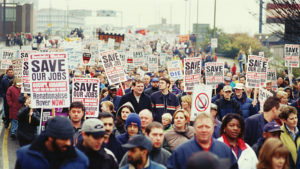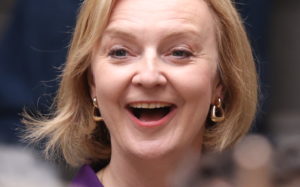On being asked what he thought of Western Civilisation, Gandhi replied “it sounds like a good idea”. I am starting to feel the same way about English Conservatism. I have never been a Conservative, but I have always felt that the Conservative Party was a legitimate part of public life. It stood for values that I did not share but which seemed coherent and worthy of respect.
Lord Hailsham famously wrote that Toryism was about fox hunting and religion (by which he meant the Anglican religion of the Book of Common Prayer). More generally, Conservatives were united by a moral belief that people had the right to dispose of their property and a practical sense that capitalism was likely to provide people with the most property to dispose of. Most of all, Conservatives believed in inequality. They thought that some people deserved to be richer, more powerful and more respected than others.
Well, fox hunting and the prayer book have both gone and no Conservative government is going to bring them back. The positions of capitalism and property are more complicated. Boris Johnson must have been the first Conservative prime minister who would not have been mortified to see it reported that he had said “fuck business”. This is partly because the Conservative Party has changed. Its leaders are relatively young, and if they pursued any career outside politics, it is likely to have been journalism.
It is also because capitalism has changed. Once it could be taken for granted that captains of industry were Right-wing in ways that bore no direct relation to their business interests. In 1977, when the CBI was asked to canvas opinions from its members about what a Conservative government should do, suggestions included restoring national service, controlling immigration and deterring couples from “living in sin”. Such opinions would be unimaginable now.
Toryism and capitalism were once joined together in institutional terms. The heads of large companies who funded the party took it for granted that their opinions would be sought and that they would count for more than rank-and-file party members. Today, however, the whole nature of business has changed. The very notion of a British company seems quaint. Note the studied vagueness of BP about what the “B” stands for and remember Margaret Thatcher’s fury when British Airways replaced the Union Jack on the tailfins of its planes with an abstract design.
Most of all, though, the Tories have lost contact with the central core of their beliefs, from which everything else springs: inequality. Just before the election of the Thatcher government in 1979, the historian Maurice Cowling edited a collection of conservative essays in which he dismissed the idea, which had become widespread during the Cold War, that Conservatism was about the defence of freedom. Conservatives, he insisted, only believed in freedom as a means to create inequality or defend existing inequalities.
I doubt if the smooth young men in Conservative Central Office would have put it in such blunt terms, but they (especially those who had recently been taught by Cowling) would have understood what he was driving at. Conservatives are less likely to defend inequality now. This is partly because nothing makes rich people more uncomfortable than the discovery that some people are even richer than themselves. Globalisation has created, and made visible, a class of super-rich people who make a Chancery QC feel like a pauper. Rishi Sunak must surely be the first Conservative politician whose career has been damaged by the fact that he is, in the eyes of many party members, too wealthy.
Real Tories believed in inequality for reasons that went beyond economics. They lived in a world of hierarchy and authority. It was a world in which tough-minded magistrates gave stiff sentences to poachers. It was underwritten, for much of the 20th century, by military experience. No institution in England reflects the class system more faithfully than the army and no social distinction is more ruthlessly policed than that between “officers” and “other ranks”. The two World Wars and the retention of conscription until the early Sixties meant there was a time when most British men had military experience. This did not make them all Conservatives — servicemen gave the Labour Party a large majority in 1945. What it did mean was that those people who were already Conservative had their belief in hierarchy reinforced.
Conservative leaders — captain Macmillan, lieutenant colonel Heath — derived much of their prestige from military rank, as did the local notables who organised the party at local level. Yet only a tiny fraction of the population has military experience now. In spite, or because, of this, Conservative fantasies focus ever more on a certain image of the military — but it is an image that is, in its odd way, democratic rather than hierarchical. For instance, one of the strongest themes in Conservative thinking now involves not the imposition of authority but the defence of relatively low-ranking soldiers who have infringed criminal law or military regulations — hence the campaign against soldiers being prosecuted for their actions in Northern Ireland or Afghanistan.
The decline in military experience goes with a more general change. Grassroots supporters of the Conservative Party have always been relatively old but the party used to have complicated relations with this group. An internal document from the early years of the Thatcher government suggested that the party’s support among the retired was a source of problems: “The Government’s economic policy is a long-term policy and the elderly do not think long term.” Of course, real Tories used to think long-term because they saw themselves as part of institutions that would continue beyond their death or simply because they spent a great deal of energy devising trust funds to benefit their grandchildren.
But this kind of long-term thinking is rarer now. Almost the defining feature of Conservative policy — with regards to everything from public debt to fossil fuel — is a slash-and-burn attitude that focuses on material gains to be made in the short term. I sometimes think that the only real Tories are the dreadlocked activists of Extinction Rebellion: people who understand that politics is about debts that might be owed to generations yet unborn and who display a commendable indifference to the short-term vagaries of electoral politics.
In any case, old age is not what it used to be. Life expectancy and early retirement have both increased — so a disconcertingly large proportion of Conservatives have not worked for many years. A person born in 1926 could claim, with some justification, that they had had a harder life than their own children and might, therefore, have been exposed to harsh realities. This is conspicuously not true of someone born, in, say 1948. These are people who were born into peace and the welfare state. They bear a disconcerting resemblance to their contemporaries who joined student protests in 1968. A part of the press serves the same function for Tory activists that hallucinogenic drugs served for the soixante-huitards: the Mail and the Express are now so removed from reality that their readers might as well be getting their information from the website of David Icke. In fact, the most notable feature of Conservative supporters is often their reluctance to grow up — which may explain why they have, in the past few years, been prone to identify with young or, in the case of Johnson, ostentatiously juvenile, leaders.
A belief in inequality co-existed awkwardly with the extension of democracy. The third Marquess of Salisbury once wrote that it would be absurd if the votes of “two day-labourers” counted for more than that of the Baron de Rothschild. What made the Tories successful in the age of universal suffrage was deference. A political scientist working in the Sixties found that many working-class Tories believed that an Etonian would make a better prime minister than a grammar schoolboy.
The problem for Conservatives now is that democracy has become far too egalitarian. Social media has encouraged the idea that everyone who can hit a keyboard has a right to have their opinion respected. Class divisions count for less as everyone affects a plebeian air — Boris Johnson seems to have been popular with working-class voters not because he is an Etonian but because they think he is “like them”. Worst of all, democracy has infected the Conservative Party itself. It seemed like a revolution when, in 1965, Tory MPs were first given the chance to elect their leader (rather than having him — it always was a him — imposed by a “magic circle” of party elders). Now, power has passed from MPs to party members, and this summer the party members imposed a leader that the majority of MPs did not want.
In easier times, Liz Truss might have been the leader to restore Conservatism. Her own origins are on the Left and her beliefs are probably those of a classical liberal, but, perhaps for that reason, she sometimes seems to understand the traditions and style of Toryism better than people who were born into Conservatism. Most of all, Truss believes in the one thing that has most embarrassed Tories in recent years: inequality. Cutting taxes for the rich would have been as Conservative as cutting benefits for the poor.
As it is, things do not look good for the Conservative Party’s electoral prospects but those of us who feel nostalgic for real Conservatism should not despair. Winning elections is over-rated. Toryism was, for much of its early history, a movement of opposition. True conservatism has, of necessity, a pessimistic, almost Sisyphean, quality: its practitioners know that they cannot really hold back change and that they will always be fighting a doomed rear-guard action.
Pessimism can produce two different forms of Conservatism. One emphasises the need to keep things going with as little damage as possible and therefore to hold on to power at all costs; the other appreciates the symbolic value of the hopeless fight. The conflict between the two approaches was incarnated in the bitter rivalry between the managerial Edward Heath and Enoch Powell, who could not see a three-line whip without voting against it or a ministerial office without resigning from it. Margaret Thatcher managed, at least when she was most successful, to combine pragmatic action with principled rhetoric — so that she sometimes seemed like the leader of an opposition to her own government.
If the most dramatic opinion polls of the last few days are correct, the Tories might not just cease to be party of government; they might not even be the Official Opposition. This would be no bad thing. Fifty or sixty Tory MPs would be just the right number. They could make their voices heard without any serious chance of controlling the commanding heights of policy. If they concentrated their efforts, they might even succeed in bringing back fox hunting.
Disclaimer
Some of the posts we share are controversial and we do not necessarily agree with them in the whole extend. Sometimes we agree with the content or part of it but we do not agree with the narration or language. Nevertheless we find them somehow interesting, valuable and/or informative or we share them, because we strongly believe in freedom of speech, free press and journalism. We strongly encourage you to have a critical approach to all the content, do your own research and analysis to build your own opinion.
We would be glad to have your feedback.
Source: UnHerd Read the original article here: https://unherd.com/




